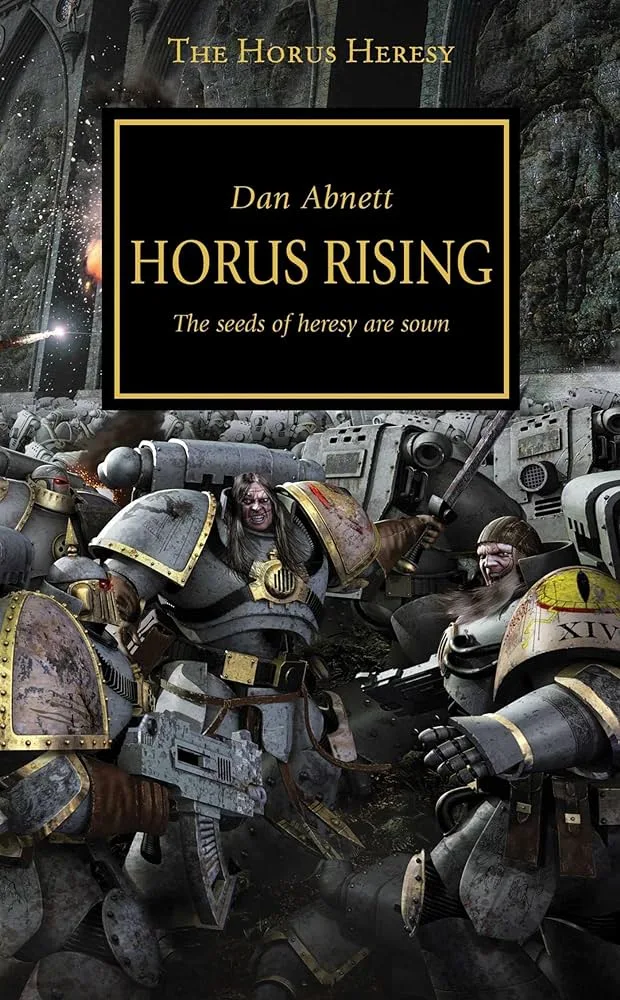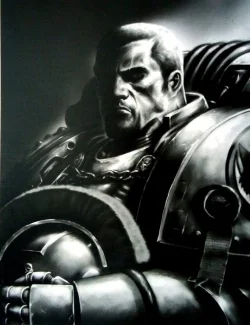Novel Review - The Horus Heresy: Horus Rising
The seeds of heresy are sown…
Horus Rising was my first foray into the novels that depicted the wider Warhammer 40K universe. While what would be later known as the Horus Heresy is a well known plot point that drives the 40K table-top narrative, aside from a brief overview we’ve never fully explored the galaxy-wide civil war that fractured the might of the Imperial regime.
Quite often talk of Horus’ betrayal was often left over to the related Codexes, or in my experience the 2nd edition rule book. Here, Games Workshop would set the scene with talk of how Horus - the Emperor’s most favourite son - turned against his father and instigated a civil war which saw nearly half of his fellow Adeptus Astartes legions follow suit and turn traitor with him. With the Horus Heresy novels, we’re now get the nitty gritty of this betrayal. It’s also a betrayal that’s spread across in excess of 60 books.
Horus Rising is the opening chapter within this vast collection and it’s writer Dan Abnett who has the unenviable task in striking the match. While Abnett focuses his story on the here and now, we do get plenty of exposition that sets Horus’ own narrative path that’ll see him rise against his own father. It’s also interesting as we see the Imperium itself go on its own journey from its ‘Golden Age’ to the oppressive quasi-religious culture that its rife with today.
The main backstory to Horus Rising is that the Emperor has retreated back to Terra and has trusted the reunification of humanity (dubbed the Great Crusade) over to his favoured son, Horus Lupercal. As Warmaster, it’s Horus’ job to walk on his fathers footsteps and be the figurehead of the crusade. While Horus leads the charge with his own legion - the Luna Wolves - he starts to question his own credibility as Warmaster, and why his father has seemingly abandoned his greatest mission for an undisclosed reason.
While Horus does feature quite prominent within the novel, our actual viewpoint is from the rank-and-file Astartes, Garviel Loken. Loken - who’s recent promotion to Captain of the Luna Wolves 10th Company has also seen him enter Horus’ inner circle as a member of his infamous Mourninval. Along with Ezekiel Abaddon, Horus Aximand, and Tariq Torgaddon, Loken and the Mourningval act as Horus’ unfiltered voice of reason and are trusted confidants to the Warmaster. However what sets Loken apart is that unlike most Astartes he shows a semblance of compassion. This becomes more prevalent as he begins to strike a relationship with the civilian contingent who’s purpose is to document the legions victories. It’s through this comradeship with the iterator Kyril Sindermann that Loken starts to see the rot that’s taking over the values of the Imperium that he once swore to protect.
The age of the Emperor reuniting the warring factions on Terra is over and the Imperium of Man is starting to subjugate the rest of the galaxy under its guise of reuniting the lost remnants of humanity. Anyone who’s different eight falls under the Emperors edict, or faces complete extermination from his “Angels of Death”. This is chiefly seen through the opening chapter as the Luna Wolves decimate the humans of Sixty-Three Nineteen for daring to worship another Emperor. A more complex narrative that winds its way through the book is one of religion. Much like those who don’t bend the knee to the Imperial war machine, religion is stamped out. According to the Emperor, there are no gods, and to say - or practice - otherwise is heresy in its self. This then stokes the flames of the Lectitio Divinitatus - a book written by the Traitor Primarch Lorgar before his fall to Chaos. Subsequently the Lectitio Divinitatus teaches that the Emperor is the one thing that he himself has abolished - a god. It’s this faith that drives the civilian side to the narrative that culminates in the inevitable rise of the modern Imperial Cult, and the Ecclesiarcy. The other driving factor to Horus Rising is the concluding (and unnecessary) war with the Interex. However it’s also here where the machinations of the Word Bearer’s Chaplin, Erebus start to take shape.
With any story written by Dan Abnett you know you’re in for a treat, and Horus Rising is no different. Abnett takes us through his many perspectives with relative ease as we easily switch between the many cast members. Nothing is left in the shadows as we get gut punching action porn, to then switch to the more somber political machinations of Horus and his Warmaster duties. Abnett also does a grand job in kicking the Horus Heresy off with a portrayal of Horus that makes the reader like him - especially when most of us know what’s coming. It’s great to see Horus’ own character come into question as he wonders himself if he is worthy of the mantle he’s been given. While this doubt does manifest into “Daddy issues” that sees him rebel against the Emperor, it makes his fall that ever more tragic.
Overall, Horus Rising is the perfect opening chapter to a story thats defined the 40K universe since it’s beginnings way back when. Abnett gives us a look into the Imperium at its height through many different perspectives. While we all know how the tale ends - it brilliant to finally experience the one event that brought the Imperium to its knees.
Rob Lake - For more comic book and video game chat why not follow us on X/Facebook @GeekCultureRev, TikTok/YouTube @Geekculturereviews, and BlueSky @geekculturereviews.bsky.social





